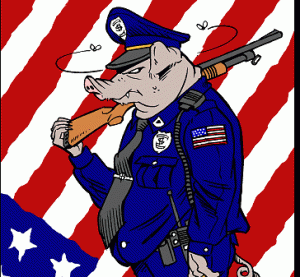[Content Notice: Gender-Based Violence, Stalking, Threats. Edited for clarity.]
Three years ago, I was starting to tentatively explore my same-sex attractions. Socially awkward as I was (and am, really), I tried various Internet outlets that were for women seeking women. Mindful of my safety, I posted a sexy pic that didn’t include my face or any identifiable information. In addition, I used an entirely different name and email address from my actual ones. To expedite the screening process, since men were sure to contact me despite my seeking women only, I included a phone number that wasn’t traceable to me.
I had posted the ad a few times with no responses other than cock shots sent to my inbox. Then, one day, my phone rang with a routed call. Excited, I picked up… only to find myself speaking to someone openly admitting he was a man. Annoyed, I told him to never call me again and hung up. He called me a dozen times; I declined the call as many times. Before giving up, he left me one hell of a voicemail.
Hi there, I was just curious why you’re so angry. You definitely are the epitome of militant lesbian. Anyway, I just thought I would call you. I’m not calling to ask you out or anything like that. I just wanted you to know– I thought you were an attractive woman and I don’t think that’s a crime to do so. Particularly when you’re inviting telephone calls when you’re posting your number so I just want you to be sure that I’m on to you and I know where to find you, okay? I would advise you be a little more cautious in your tone with people and you’re gonna need to start watching your back.
He was straight-up threatening me in the calmest, creepiest tone possible.
On a hunch, I googled his phone number and email address. He turned out to be some kind of Hollywood producer. Although part of me recognized that I had my bases covered in terms of identity protection and he clearly wasn’t the sharpest knife in the drawer for using his work email and number to threaten me, the eerie calm in his voice scared me. As I had grown up in a very safe suburban city, I was sure that the police would be sympathetic and helpful. Accordingly, I created a hard-copy record of his threat and I headed over to my then-city’s police department.
When the officer called me in, I was shaking a bit, but spoke as clearly and calmly as possible, presenting my evidence and voicing my fears. He responded with laughter.
Taken aback by his trivialization of the situation, I asked him if he could look at my evidence. I knew who the guy was, I pleaded. Couldn’t he, as an officer of the law, do something? Take the guy to task for threatening me somehow? At least take down a report so that if something happened, there was a record? He replied with an incredulous no to all my inquiries.
Out of the blue, he asked me if my picture included my face. I said no. He asked me how I expected to attract responses with a picture that didn’t include my face. Before I could respond, he answered his own question: it was a sexy picture, was it not? Feeling shamed, I was unable to speak and merely nodded.
“Don’t worry about it, then,” he chuckled. “Go home.”
What choice did I have other than to begin to gather up my things and prepare to leave? Before I could make my exit, though, he told me that he often visits women-seeking-women for the pictures, winked at me, and expressed his hope that he would see me on there sometime. Taken aback by the lechery in his tone, I half expected him to take a swat at my ass as I walked out the door.
The rest of that day, I lay in bed, frightened and confused, yet somehow feeling that I had deserved it. I had, in a few hours, lost my naive trust in the law and learned why it can be so difficult for some women in situations with aggressively sexual men to stand up for themselves. I was so ashamed that it took me years to tell anyone about what happened.
Once upon a time, I used to tell women to firmly stand up to men who pursued them despite a lack of mutual interest. I know better now — it’s more complicated than that. I know that I’m not the only woman to get violent responses from the men I ignore or otherwise rebuff, online and off. I know that far worse could have easily happened. I know that far worse does happen. Once upon a time, I told fellow women that if rejected men got aggressive, they should go to the police and thought it was silly if they hesitated to do so. As it turns out, many women have their reasons. In my experience, the men who threaten women aren’t necessarily so different from the men who are supposed to represent the law — and, at least in my case, the officer was happy to openly tell me so.



